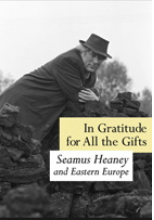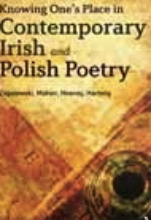of Victoria
BA (Harvard), PhD (UC Berkley)
Twentieth- and twenty-first-century British poetry; Irish poetry; Polish poetry; comparative literature; poetics
Education
I received a B.A. (magna cum laude) in English from Harvard University in 1999, and a Ph.D. in Comparative Literature from the University of California, Berkeley, in 2007. I have been working at the University of Victoria since 2007.
Teaching
I teach twentieth and twenty-first-century British and Irish literature. My recent undergraduate courses include surveys of modern and contemporary poetry (English 434A and 434B), surveys of modern and contemporary fiction (English 436A and 436B), an introduction to modernism (English 201), and a seminar on practical criticism (English 310). Recent graduate courses include a course on major poets of the twentieth century (English 560) and a survey of twentieth-century Irish literature (English 561).
Research
My current research focuses on twentieth and twenty-first-century British and Irish poetry. I am, however, also interested in viewing this poetry comparatively, especially given how often it enters into dialogue with poetry from other places. I also have a strong interest in contemporary Polish poetry, especially that of Czeslaw Milosz.
My most recent book is entitled Poetry Against the World: Philip Larkin and Charles Tomlinson in Contemporary Britain (forthcoming from Routledge, 2018). This book begins with a premise: antagonism is often at the heart of great modern poetry. These two representative poets, who have opposite aesthetic ambitions yet are both considered paragons of Englishness, pitch their poetry against an inhospitable world. Both Larkin and Tomlinson refuse the consolations of religion, but is it possible to maintain a demystified sense of the aesthetic if one wishes poetry to be able to stand against the world? This book asks how they seek to redress an “age of demolition” through their poetry, and how their audiences react to the types of redress they propose.
My second book, In Gratitude for All the Gifts: Seamus Heaney and Eastern Europe (University of Toronto Press, 2012), examines the influence of Eastern European poets--in particular, Czeslaw Milosz, Zbigniew Herbert, Joseph Brodsky, and Osip Mandelstam--upon Seamus Heaney. It situates this influence within a broader discussion of how and why Eastern European poetry proved to be especially exciting to English-language readers in the Cold War period, and why a poet such as Heaney would participate in this enthusiasm.
My first book, Knowing One's Place in Contemporary Irish and Polish Poetry (Continuum [Bloomsbury], 2012), compares contemporary poetry from Ireland and Poland, two post-colonies within Europe, with a particular focus on the theme of spatio-cultural belonging. It brings together Northern Irish and Polish poets who rebel against strict, conventional, and politically binding forms of identity, who are haunted by a sense of not belonging in their own homes, and who revisit (and sometimes criticize) their own claims of identity.
My articles have appeared in journals such as Comparative Literature, Comparative Literature Studies, An Sionnach, New Hibernia Review, Canadian Journal of Irish Studies, Polish Review, Studi irlandesi, The Humanist, and The American Scholar. I regularly review for World Literature Today and the Dublin Review of Books.
Poetry Against the World: Philip Larkin and Charles Tomlinson in Contemporary Britainbrings together two major poets, who espouse opposite aesthetic ambitions, yet are both taken as paragons of Englishness, in order to ask how they pitch their poetry against an inhospitable world. This book explores how these two representative poets seek to redress an "age of demolition" through their poetry, and how their audiences react to the types of redress they propose.
 University of Toronto Press, 2012
University of Toronto Press, 2012
In Gratitude for All the Gifts explores the literary and cultural links between the bestselling, Nobel Prize-winning Northern Irish poet Seamus Heaney and the preeminent Eastern European poets of the twentieth century, including fellow Nobel laureate Czeslaw Milosz and Zbigniew Herbert. Magdalena Kay opens new ground in comparative literary studies with her close analysis of Heaney's poetic work from the perspective of the English-speaking West's attraction, and especially Heaney's own attraction, to Eastern European poetry.
While placing Milosz and Herbert in their cultural contexts and keeping an eye on the poems in their original Polish, this innovative and energetic study focuses on how Heaney encountered their work in translation. In Gratitude for All the Gifts thus allows us to see what happens when poetic forms, histories, and themes travel between countries and encourages us to understand cultural crossing not just thematically, but also in terms of form, voice, and aesthetic intent.
 Continuum, 2012
Continuum, 2012
Are we allowed to choose where we belong? What pressures make us feel that we should belong somewhere? This book brings together four major poets--Heaney, Mahon, Zagajewski, and Hartwig--who ask themselves these questions throughout their lives. They start by assuming that we can choose not to belong, but know this is easier said than done. Something in them is awry, leading them to travel, emigrate, and return dissatisfied with all forms of belonging.
Writer after writer has suggested that Polish and Irish literature bear some uncanny similarities, particularly in the twentieth century, but few have explored these similarities in depth. Ireland and Poland, with their tangled histories of colonization, place a large premium upon knowing one's place. What happens, though, when a poet makes a career out of refusing to know her place in the way her culture expects? This book explores the consequences of this refusal, allowing these poets to answer such questions through their own poems, leading to surprising conclusions about the connection of knowledge and belonging, roots and identity.
Comparative Literature
World Literature Today
The Chronicle of Higher Education
New Hibernia Review
Comparative Literature Studies
An Sionnach: A Journal of Literature, Culture, and the Arts
Canadian Journal of Irish Studies
Notes & Queries
The Polish Review
Studii Irlandesi
Chapter: “Theorizing Change in Postcolonial Poland,” in New Perspectives on Polish Culture: Private Encounters, Public Affairs (PIASA Books, 2012)
Chapter: “Death and Everyman: Imagining a ‘Not Unwelcoming Emptiness,’” in ‘The Soul Exceeds its Circumstances’: The Later Poetry of Seamus Heaney. University of Notre Dame Press, 2017.
Reviews:
Slavic and East European Journal
Breac: A Digital Journal of Irish Studies